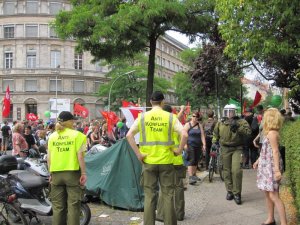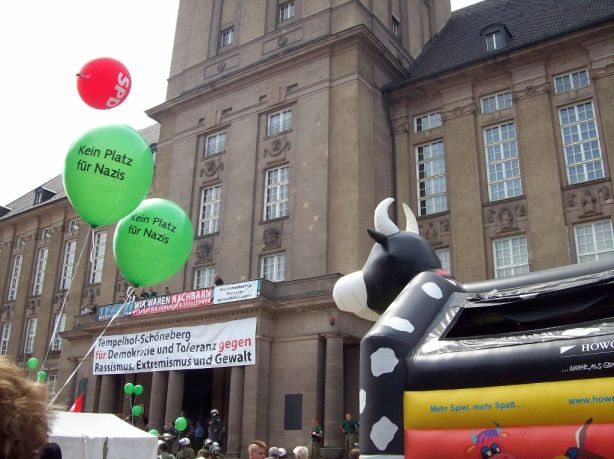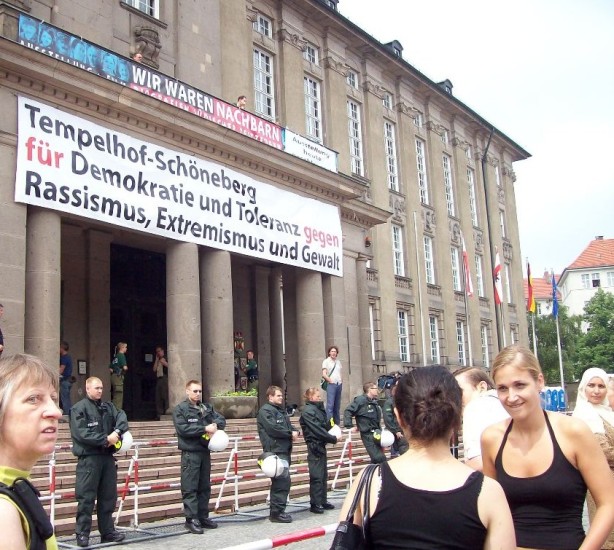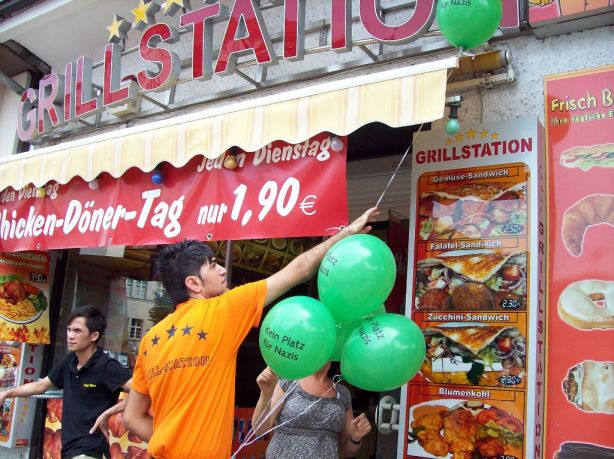No space for Nazis
_______________________________________________
Neo-Nazis keep out!
Kein Platz für Neonazis
photos: David Schliesser
Demonstration against neo-Nazi group “Pro Deutschland”, Schöneberg Town Hall Berlin, 17 July 2010
Konflikt & kebabs
Scene: Berlin, mid-July 2010. Outside Schöneberg Town Hall, noontime on a warm overcast
Saturday.
A ritual is being enacted that has become typical of local politics in 21st century Germany.
A far right group demonstrably exercises its democratic rights by booking a meeting room in
a public hall. Local anti-fascist coalitions try to prevent this through the courts. They usually
lose because the German constitution guarantees freedom of assembly in public space for
lawful organisations.
In this case the far right group is a new crew, Pro Deutschland, that aims to pick up on the
success of the anti-Muslim movement, Pro Cologne, and the Swiss anti-mosque referendum last
November. Expert observers of the far right are still arguing about whether Pro Deutschland
is neo-Nazi or extreme populist. Like many similar groups, its politics are intentionally hazy
and incorrigibly opportunist, so it’s hard to pin down. Its official website and Facebook page
tell you it wants to be “different from all the other groups”, and stands for “people who want
to preserve the traditional Western character of Germany”. Implicitly this means they oppose
what they see as the ‘Oriental’ influence of Muslims in Europe. Their PR is pepped up with
the colours of the German flag and their current keynote campaign is to keep Turkey out of
the EU.
We get the message. And we don’t want them in our town hall. On this July Saturday, the
building is besieged by political party chapters and multifarious independents who have
gathered to protest. Last night local groups lost their last-minute appeal to prevent Pro
Deutschland holding their national conference here today, and anti-Nazi networks have been
frantically mobilising since then. They are hoping to stop the meeting with the kind of
peaceful blockade that has proved successful against Nazi marches on various occasions
recently.
Schöneberg Town Hall, a massive stone edifice built around 90 years ago, became famous as
West Berlin’s town hall and the home of the West Berlin state assembly during the Cold War.
The renowned Freedom Bell, a gift “from the American people” in 1950, still rings out today
from the old bell tower, and you can still see the balcony where President Kennedy made his
much-quoted proclamation, “I am a Berliner”, earning the world’s admiration for his defiant
attitude to the Russians and his valiant attempt at German pronunciation. Nobody can claim
this is a beautiful building. But it has played its role in history and though it stands now as a
rather sorry monument to German local bureaucracy, casting its huge shadow on a noisy trunk
road called Martin-Luther-Strasse, it inspires a certain affection for its weekend flea market
that has made the transition in the past 20 years from a junk exchange for Turks and Poles to a
slightly more upmarket junk outlet for émigré Russians with a taste for fake labels.
The flea market is buzzing on the town hall forecourt when we arrive. The usual Saturday
clientele is milling around the stalls. At the foot of the wide steps leading up to the main
entrance, children are bouncing up and down in the belly of a huge inflatable cow. Close by, a
swarm of young men mostly in black, grey, and extravagant tattoos are testing the sound
system for an open stage. Shortly they’ll start deafening the crowd with a mix of political
exhortation and loud music. An anti-fascist Turkish beat box group emerges as the hit of the
day. The rumour goes around that Dr. Motte, the man who started the Love Parade in Berlin,
is somewhere on the park side of the building where the gay action groups are gathering —
the opposite side to where the Social Democrats (SPD) and public service union, Verdi, have
pitched camp with their PA systems.
In the political PR stakes, the day’s five-star rating goes to the Green Party. Having nabbed
the best location with their big & bright green sunshade directly on the northern corner of the
main road, where most people enter the forecourt, they are doing a roaring trade in handing
out green balloons faster than they can blow them up. The balloons carry the legend, KEIN
PLATZ FÜR NAZIS (No place for Nazis). Within minutes nearly every child on the square is
toting a green balloon, and in the press write-ups no photo of the event is complete without
one. The slim red rubber wristbands distributed by the SPD are stamped with the words
Lebendig. Einig. Mutig. (Lively. United. Courageous.) Rather limp post-Bastille Day
sentiments. Two stars for trying.
Suddenly, in the way crowds move, there is a mass swing around the corner towards a café
where the Pro Deutschland leaders are reputedly sitting it out till their conference begins. An hour earlier, we had pursued this rumour to the café and seen a group of people sitting at tables at the far corner of the front terrace, but it was impossible to identify them as Pro Deutschland members. Today’s extreme right-winger wears chainstore T-shirts and summer fashions just like the rest of us — especially if he or she is a committee member on the way to the first national conference in the capital. Anyway, in the heatwave even their bully boys have probably left their bovver boots at home.
However, since our inconclusive recce the rumour seems to have firmed up, and now the action is shifting fast, away from the town hall towards the café. Police cars and vans are revving up. A detachment of helmeted cops in full riot gear heads down the street at a trot, forcing demonstrators and passers-by out of the way.
Camera at the ready, I crawl through hedges at the side of the road trying to get a glimpse of
the action and a picture of the policeman up ahead who is filming all of us with a cam on a
pole, one by one, you can watch it cruise and turn above the crowd like a submarine
periscope. We can feel the squeeze as the cops move in, pushing the crowd together from all
sides. Unable to get through, a film cameraman jumps onto a yellow mailbox and proceeds to
shoot from that vantage point, supported by other crew members. Meanwhile police vehicles
are positioning behind us to seal off escape routes. Beneath the helmets the cops’ faces have
that familiar brutal expression. I get away before the violence starts. Later we hear that the
police fired pepper spray and arrested eight people after some heavy truncheoning.
Back on the town hall forecourt, some of the marketeers have already given up and packed
up. There is hardly space to move now. Political groupings have mushroomed between the
stalls of old books and clothes and obsolete electrical goods. The Communist Party is here
(it’s always something of a surprise that there is still a party with that name…); a couple of
fringe groups with mysterious initials and anti-racist internationalist placards (Maoists,
maybe?); and Die Linke, the Left Party, whose members have planted a standing banner that
looks like a catamaran sail with a heavy metal base, and are standing proudly on either side of
it, the young ones close to the stage which is vibrating with earsplitting beatbox sounds, the
older ones further away from the racket.
We have already met plenty of friends and neighbours, and more keep passing by, along with
vaguely familiar faces from previous anti-Nazi events. With the children still bouncing inside
the inflatable cow, the streams of bargain hunters and Saturday strollers, the ceaseless
bellowing from the stage and the pervading smell of stale bratwurst and chips, it could be one
of the street festivals that entertain the neighbourhood and divert the local traffic in Berlin on
weekends throughout the summer. — Until we hear somebody complaining loudly that the
Pro Deutschland members have been specially bussed in by Berlin Public Transport, and we
realise that the way to the town hall steps is now completely cut off by police barriers, behind
which a row of riot police has effectively sealed off access to the building.
In front of the barriers is a line of police officers with fluorescent yellow vests labelled “Anti-
Konflikt Team”. Very Denglish. Maybe they are the police version of cool. They seem to
stick together in twos. Going up to one female couple, I address the woman nearest to me, at
which her partner moves away slightly as if to allow a one-to-one encounter.
Karen: What does the writing on your vest mean?
Anti-Konflikt cop (slightly defensively): This? Oh, I’m just doing my job. My job is to tell the
citizens that I’m not here to protect one side or the other, I’m here to be neutral.
(She grins, just like she was told in her training: be polite, friendly and reassuring at all times.
Yet her tone has an edge of irritation.)
Karen: I don’t understand. Have people been complaining that the police are protecting the neo-Nazis?
(Karen gestures towards the riot police standing behind the Anti-Konflikt cop.)
Anti-Konflikt cop (slightly irritably): Well, it’s like this. We’re here to see that democracy is
upheld. We’re here to stop the people who want to disturb the peace.
Karen (pointing to the inflatable cow, the rappers on stage, the bargain hunters, the waiting
demonstrators): Who wants to disturb the peace?
Anti-Konflikt cop: It’s the left. They want to stop a legal conference going on in the town hall.
And we’re here to prevent that.
Karen (surprised): Did you say the left? Why the left? Look, I live just down the road there,
I’m here with my family and friends to stop racists and neo-Nazis from using our town hall for
their meetings. This is my town hall. This is where we stand in endless queues at the citizen’s
office to register change of address or apply for new identity cards. I’m here as an ordinary
resident, not a member of any political party. How can you call us all “the left”? What kind of
labelling is that?
Anti-Konflikt cop (slightly exasperated): There’s nothing wrong with what I said. People talk
all the time about right and left. You ask me why I said the left, and I’ll tell you: because that’s
what I can see. (She points at the banner behind me.) See! – that’s what it says there: Die
Linke. The left. That’s what I said, didn’t I?
Karen: What have you got against Die Linke? It’s a perfectly respectable party, it’s actually
part of the government in Berlin. It has every right to be here. So why did you say they want
to cause trouble?
Anti-Konflikt cop (slowly, doggedly): Because the left wants to disrupt. And it’s our job to
prevent that.
Karen: Did you get special training for this job?
Anti-Konflikt cop (slightly red in the face): Yes, as a matter of fact, I did. Why are you
asking?
(Karen’s companion interrupts the Anti-Konflikt cop’s left-equals-troublemakers mantra by
asking how she personally feels about neo-Nazis holding meetings and marches under police
protection. After a moment’s hesitation, she tells him she can’t answer because she’s here in
her official capacity. But then she drops her defences, and smiles at him, rather shamefacedly.)
Inwardly Karen is cursing the bitter pill of fate she has just been forced to swallow. She, an
ex-Trotskyist, obliged to defend the democratic rights of Die Linke, the acknowledged heirs of
Stalinism — and all because of an ignorant Anti-Konflikt cop who was focused against the
left and got frozen there.
We cross the road to the doner kebab bar just in time to see the Turkish owners decorating the
façade with green balloons. NO PLACE FOR NAZIS. The snack bar is soon packed with
hungry demonstrators of all political colours. Sometimes protest pays.
Epilogue: After holding their meeting under police protection in the town hall, Pro
Deutschland proclaimed it a triumph for “civil obedience” — and applauded the forces of law
and order for keeping “the left” in check.
Demonisation of democratic opposition seems to be quite the fashion again in Germany.
© Karen Margolis Berlin, 20 July 2010









Thanks Karen. A valuable insight….